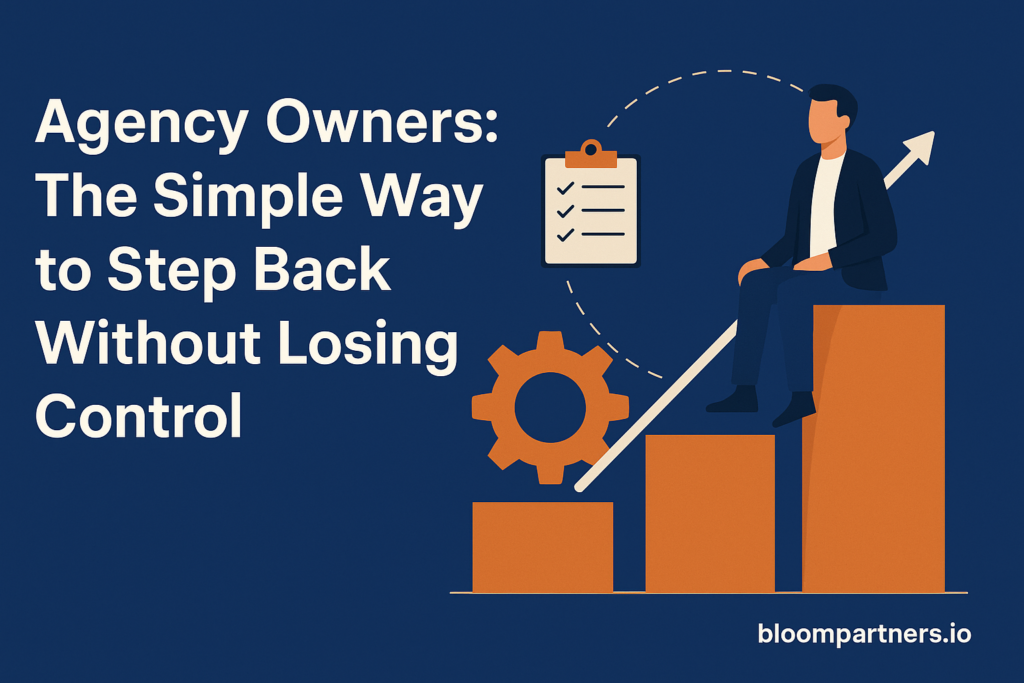Agency Owners: The Simple Way to Step Back Without Losing Control
Stepping back from your agency does not mean surrendering your authority or watching your business collapse—it means strategically creating a well-oiled machine that can run without you calling every shot.
Too many agency owners think freedom from day-to-day operations must come at the price of losing touch with their business. Let’s crush this misconception right now. Done correctly, stepping away grants you the necessary breathing room to concentrate on growth, innovation, and building the lifestyle you’ve been craving. Let’s skip the theory and dive into exactly how you can start stepping back without losing one ounce of control or sacrificing agency momentum.
First, Map Out Your Freedom Blueprint
Here’s exactly how you do it. Before you delegate a single task or restructure your agency, pause and visualize precisely how your ideal day-to-day freedom scenario looks. Define clearly where you want to stand as a leader. Do you still want weekly check-ins? Monthly overview reports? Quarterly strategic planning meetings? Knowing these parameters from the start will keep you comfortably in the driver seat without being bogged down by details.
Start by creating a simple chart outlining all the tasks you currently perform each week. Separate the tasks into three distinct buckets:
- Tasks you must immediately delegate
- Tasks you could soon delegate with proper team training
- Critical tasks you’ll retain (at least initially) to ensure stability
This step alone brings immediate clarity. You’ll find plenty of low-value activities draining your bandwidth that are prime for delegation.
Build Systems That Replace You
Without clearly defined systems, you’ll always be chained to your business. Agency freedom hinges heavily on designating repeatable processes people can execute consistently, without your approval at every turn.
Start by creating Standard Operating Procedures (SOPs) around your agency’s most common workflows. Cover processes like client onboarding, reporting, campaign management, and issue resolution. Your SOPs don’t need to be lengthy; just clearly explain the basic steps and purpose for each task involved. Use screen recordings, checklists, and step-by-step outlines. The clearer your instructions, the simpler it is for team members to confidently take control in your absence.
Next, ensure your core operations leverage tracking and management software. Automate where possible, implementing task-tracking tools like Monday.com or Asana with dashboards that display assigned tasks, deadlines, and task progress. Setting this up ensures you maintain direct visibility into your agency’s internal performance at any given moment—no guesswork, no losing control.
Master Strategic Delegation
Delegation is your ticket to freedom, but it must be strategic instead of reactive. The biggest pitfall I repeatedly see is agency owners randomly delegating tasks without clearly defining role expectations and accountability. To avoid confusion and chaos, practice the following delegation framework:
- Select the right individuals who have demonstrated reliability and capability.
- Clearly explain the outcome you expect from the assignment.
- Be transparent about decision-making authority your team member now holds.
- Set checkpoints for initial reviews to ensure standards and quality are maintained.
Delegation is not simply offloading tasks—it’s empowering your team with confidence, autonomy, and clear targets. Not only does strategic delegation free your time, but it also builds stronger team leadership, elevating overall agency performance.
Create Transparent Communication Channels
Transparency fosters control, trust, and positive outcomes inside agencies. The anxious thought of stepping back usually manifests from not knowing what’s happening. Consistent, structured communications drastically reduce this anxiety. Schedule weekly or bi-weekly “Quick Hits” meetings where leadership provides you concise updates on key performance indicators, ongoing projects, new client acquisitions, or current challenges.
Maintain a clear “open line” communication policy. Encourage your team to proactively reach out whenever concerns arise or decisions require your strategic input. The result? You retain oversight without micromanaging, and your team feels empowered instead of helpless.
Avoiding the Common Pitfalls
Don’t underestimate the complexity of clarity. Vague directions encourage dependency, confusion, and chaos. Don’t hedge on your authority either—being clear about decisions your team can make versus decisions only you should make eliminates ambiguity around accountability. Finally, don’t rush out of daily operations too aggressively. Gradual transitions, frequent check-ins, and consistent reinforcement of your expectations enable a smooth, controlled separation that builds long-term sustainability.
Now Is Your Moment—Take Action Today
You started your agency for freedom—to live life on your terms, control your income, and decide where your energy is best spent. Waiting for a mythical moment when you’ll magically have that freedom does not work—you must actively build it starting today through intentional planning, structured systems, and effective delegation.
Executing the practical steps outlined above positions you effortlessly as a visionary leader who still holds the reins securely. Don’t wait another day—map your freedom blueprint now and watch your dream of agency autonomy swiftly become your reality.


